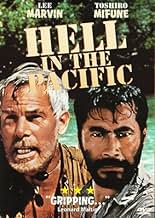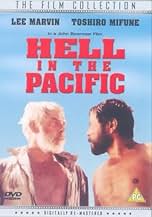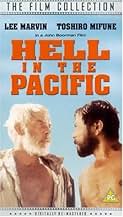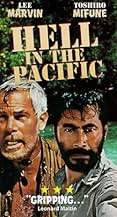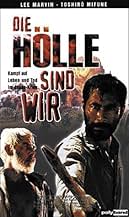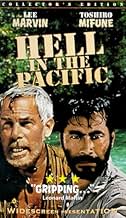IMDb RATING
7.2/10
9.5K
YOUR RATING
During World War II, an American pilot and a marooned Japanese navy captain are deserted on a small uninhabited island in the Pacific Ocean. There, they must cease their hostility and cooper... Read allDuring World War II, an American pilot and a marooned Japanese navy captain are deserted on a small uninhabited island in the Pacific Ocean. There, they must cease their hostility and cooperate if they want to survive, but will they?During World War II, an American pilot and a marooned Japanese navy captain are deserted on a small uninhabited island in the Pacific Ocean. There, they must cease their hostility and cooperate if they want to survive, but will they?
- Director
- Writers
- Stars
- Awards
- 1 win & 2 nominations total
Toshirô Mifune
- Captain Tsuruhiko Kuroda
- (as Toshiro Mifune)
Featured reviews
Not only is this film a fascinating account of survival against odds, its a reflection of cultural differences within a crucial historical timeframe. Its narrative may be flawed, a little too stylized, but it features two of the greatest faces of 60s cinema history: Marvin and Mifune. Looking back on the second world war, it seems ironic that the Japanese believed their culture was superior in warfare, and the Americans believed theirs was superior for peace. In the end it will turn out to be the other way around. This film touches on that subject, highlighting Marvins aggressive, loud, and brutal behavior, and Mifunes quieter, more methodical survival methods. But in their battle to survive, the two men become almost indistinguishable. The most touching scene in the film: Both men collapsed in their sinking raft, dejected, exhausted, dehydrated, totally at their mercy of nature, a symbolic scene for human life. The DVD i saw contained both endings, the original, never seen in TV prints, much more believable and satisfying.
I only discovered Hell in the Pacific after searching for Lee Marvin films as I have become enamored with his work as of late. I thought this was going to be a war movie from start to finish, which I'm not always a big fan of. I am glad to say I was surprised and very pleased with this film.
This is a rare work of film that uses two actors, limited dialog(half of it in Japanese), and only one location. There have been many attempts at making movies about people stranded on islands, but this one pulls it off in a way no other has.
Thsi is a film about not only survival, but overcoming prejudice towards ones sworn enemy in a time of war. It is about moving past the fears of what you do not know, and using what you do know and the basic need to survive to pull through and band together.
I was more enthralled by this movie with almost no dialog, than I have been with movies that have won screenplay Oscars. To me, this is an example that if you have the right actors, the right story, and the right setting, dialog is not always necessary.
This is a rare work of film that uses two actors, limited dialog(half of it in Japanese), and only one location. There have been many attempts at making movies about people stranded on islands, but this one pulls it off in a way no other has.
Thsi is a film about not only survival, but overcoming prejudice towards ones sworn enemy in a time of war. It is about moving past the fears of what you do not know, and using what you do know and the basic need to survive to pull through and band together.
I was more enthralled by this movie with almost no dialog, than I have been with movies that have won screenplay Oscars. To me, this is an example that if you have the right actors, the right story, and the right setting, dialog is not always necessary.
During the Second World War, on a small, inhospitable island somewhere in the Pacific Ocean, two men are stranded. One is an American Pilot, the other a Japanese Naval Captain. When they become aware of each other's presence, their military training kicks in, and the two begin to battle. However, it soon becomes painfully clear that neither man will survive the island without the other's help. Whether or not they are able to set aside their differences and work together, or destroy one another for the glory of their nation, remains to be seen in John Boorman's powerful anti-war allegory, 'Hell in the Pacific.'
Boorman's third feature film, 'Hell in the Pacific' tells a relatively simple tale- arch-enemies forced to unite under circumstances beyond their control- in an astute and subtle manner. It is a quiet movie featuring characters given to introspection- often there is very little dialogue. A lot is said in that silence however, through the striking visuals, with the thick atmosphere, and by the presence and physicality of stars Lee Marvin and Toshiro Mifune. There are moments of levity, and it's a very suspenseful watch; but at its heart 'Hell in the Pacific' is a barbed treatise.
Through the understated story- written by Reuben Bercovitch, Alexander Jacobs, Eric Bercovici and Shinobu Hashimoto- a clear, humane message about the indignities and pointlessness of war emerges, and no side is given preferential treatment, no bias is injected into the screenplay. 'Hell in the Pacific' is a masterful war film- or anti-war film, one should say. For that is the crux of the narrative and the center of the allegory that 'Hell in the Pacific' is: war is hell, and there's no war when rivals unify; an aphorism bordering on the trite, but one that is apt nevertheless.
A highly visual experience, 'Hell in the Pacific' features fine, striking cinematography from Conrad Hall. Hall's work lends to the film something of a dream-like atmosphere, though is still firmly rooted in the naturalistic tradition. It is dramatic camera-work that lingers in the memory long after the film has ended. Boorman's films are always visually stimulating affairs, and 'Hell in the Pacific' ranks as one of his most rich, stylish and gritty.
Thomas Stanford's editing is sharp, establishing the film's pace, which is steady and smooth; though not overly brisk or without moments of sedation. Many critique the unexpected abruptness of the ending, but it is in keeping with the tone and themes the film tries to explore. Lalo Schifrin's muted, melodic score contributes to this tone, bringing to the film additional beauty, as well as additional devastation and impact.
'Hell in the Pacific'- for all of the merits listed above- could easily have faltered had casting gone in a different direction. Thankfully, Marvin and Mifune were secured, and deliver performances of incredible intensity, humor and depth. Marvin is too often remembered as an action star or a heavy, when in reality his talents extended far beyond that. He brought a charm and sense of purpose to every role he played, as well as an ease of performance that makes him mesmerizing on screen. His performance in 'Hell in the Pacific' is up there with his equally powerful one in 'Monte Walsh'; work of extreme emotional perspicuity that is most underrated.
Any film fan knows of the immeasurable talents of Toshiro Mifune. He could play any kind of character: drunkards, gangsters, fools- all with Shakespearean intensity. He also possessed masterful comedic timing, as well as being one of the most skillful expressionistic figures to ever grace the cinema screen. His performance in 'Hell in the Pacific' is understated, captivating and powerful; probably the best he ever gave in a production outside of Japan. He and Marvin share an electric chemistry that makes watching them on screen a real pleasure.
'Hell in the Pacific' is a masterful movie, a subtle story told with verve and intelligence. Deftly directed by John Boorman, beautiful in terms of visuals and featuring a fine Lalo Schifrin score, the film is utterly unforgettable. Lee Marvin and Toshiro Mifune deliver two brilliant performances that are highlights in both their careers. Hard-hitting and containing allegorical depth; there are few anti-war films as impactful. In short, 'Hell in the Pacific' is heaven in the cinema.
Boorman's third feature film, 'Hell in the Pacific' tells a relatively simple tale- arch-enemies forced to unite under circumstances beyond their control- in an astute and subtle manner. It is a quiet movie featuring characters given to introspection- often there is very little dialogue. A lot is said in that silence however, through the striking visuals, with the thick atmosphere, and by the presence and physicality of stars Lee Marvin and Toshiro Mifune. There are moments of levity, and it's a very suspenseful watch; but at its heart 'Hell in the Pacific' is a barbed treatise.
Through the understated story- written by Reuben Bercovitch, Alexander Jacobs, Eric Bercovici and Shinobu Hashimoto- a clear, humane message about the indignities and pointlessness of war emerges, and no side is given preferential treatment, no bias is injected into the screenplay. 'Hell in the Pacific' is a masterful war film- or anti-war film, one should say. For that is the crux of the narrative and the center of the allegory that 'Hell in the Pacific' is: war is hell, and there's no war when rivals unify; an aphorism bordering on the trite, but one that is apt nevertheless.
A highly visual experience, 'Hell in the Pacific' features fine, striking cinematography from Conrad Hall. Hall's work lends to the film something of a dream-like atmosphere, though is still firmly rooted in the naturalistic tradition. It is dramatic camera-work that lingers in the memory long after the film has ended. Boorman's films are always visually stimulating affairs, and 'Hell in the Pacific' ranks as one of his most rich, stylish and gritty.
Thomas Stanford's editing is sharp, establishing the film's pace, which is steady and smooth; though not overly brisk or without moments of sedation. Many critique the unexpected abruptness of the ending, but it is in keeping with the tone and themes the film tries to explore. Lalo Schifrin's muted, melodic score contributes to this tone, bringing to the film additional beauty, as well as additional devastation and impact.
'Hell in the Pacific'- for all of the merits listed above- could easily have faltered had casting gone in a different direction. Thankfully, Marvin and Mifune were secured, and deliver performances of incredible intensity, humor and depth. Marvin is too often remembered as an action star or a heavy, when in reality his talents extended far beyond that. He brought a charm and sense of purpose to every role he played, as well as an ease of performance that makes him mesmerizing on screen. His performance in 'Hell in the Pacific' is up there with his equally powerful one in 'Monte Walsh'; work of extreme emotional perspicuity that is most underrated.
Any film fan knows of the immeasurable talents of Toshiro Mifune. He could play any kind of character: drunkards, gangsters, fools- all with Shakespearean intensity. He also possessed masterful comedic timing, as well as being one of the most skillful expressionistic figures to ever grace the cinema screen. His performance in 'Hell in the Pacific' is understated, captivating and powerful; probably the best he ever gave in a production outside of Japan. He and Marvin share an electric chemistry that makes watching them on screen a real pleasure.
'Hell in the Pacific' is a masterful movie, a subtle story told with verve and intelligence. Deftly directed by John Boorman, beautiful in terms of visuals and featuring a fine Lalo Schifrin score, the film is utterly unforgettable. Lee Marvin and Toshiro Mifune deliver two brilliant performances that are highlights in both their careers. Hard-hitting and containing allegorical depth; there are few anti-war films as impactful. In short, 'Hell in the Pacific' is heaven in the cinema.
What I would give to know only Japanese and watch this movie. You don't have to understand what Toshiro Mifune is saying to understand this movie.
Does war extend to the individual? Trained to kill or be killed, two adversaries face off. Each with his own fear that the other will succeed. Why didn't they kill each other when they had the chance? Because man is a social animal and he needs the company of others. To use a cliché - No man is an island.
And in the end conflict erupts. Not because of any innate difference between the two men - but because of how they define themselves in a greater scene. I am Japanese - you are American (and vice versa). Throw in the element of non-communication (neither spoke any of the other's language) and you have it.
Two great actors, a great script, a grand theme.
Does war extend to the individual? Trained to kill or be killed, two adversaries face off. Each with his own fear that the other will succeed. Why didn't they kill each other when they had the chance? Because man is a social animal and he needs the company of others. To use a cliché - No man is an island.
And in the end conflict erupts. Not because of any innate difference between the two men - but because of how they define themselves in a greater scene. I am Japanese - you are American (and vice versa). Throw in the element of non-communication (neither spoke any of the other's language) and you have it.
Two great actors, a great script, a grand theme.
Was there a better hard man in the 70's then Lee Marvin ? I don't think so. Team him up with Toshiro Mifune (yojimbio, Seven Samurai), gorgeous scenery (Paulau islands) under the light hand of John Borman (Deliverance) and watch as a simple story grows and develops into a visual feast. There is no lead-in to the film, all we see is a lone Japanese soldier on a tropical island spotting a life raft and realising he is suddenly not alone, and worse, his company is an enemy soldier. The initial confrontations are tension filled as the two chase each other around and around their new home in a battle of wits and cunning. Eventually the inevitable happens and they are forced to start living together. Rather than a Disneyish style 'lets all learn to live together because we are all really the same under the skin' co-operation, the two have as little to do with each other as possible, unless arguing about possession of driftwood (in a scene that left me in tears of laughter). Eventually they do co-operate through necessity to leave the island and develop a bond of friendship through adversity, only to have this challenged when exposed to the realities of the world outside their desert island refuge. A bitter but unavoidable ending reminds us of the insanities of war. I loved this film because it was totally gripping in a way few movies are, I genuinely cared about the characters. It was in some ways like watching 'survivor' in the way the relationship changed-only in reverse- so naturally did it happen on screen. Bormans direction was great, more of a fly on the wall perspective that made the story all the more involving. This movie deserves to be seen.
Did you know
- TriviaBoth Lee Marvin and Toshirô Mifune actually served in the Pacific during World War II, of course on opposing sides. Marvin was a US Marine. He was wounded during the war and received the Purple Heart during the Battle of Saipan in 1944. Mifune served in the Imperial Japanese Army Air Service.
- GoofsLee Marvin was 44 at the time of filming, as evident by his gray hair. Toshiro Mifune's character also calls him an "old man" several times. WWII US Navy pilots Thus, he looks much too old for an actual WWII US Navy pilot, who were mostly in their twenties or early thirties.
- Quotes
American Pilot: Oh, for a second I thought you were a Jap.
- Alternate versionsAmerican version featured an alternative ending where the two get drunk and walk off in separate directions arguing at each other; in the British version (which was exactly the same as the Japanese version), they start yelling and a bomb from the sky falls and blows everything apart.
- ConnectionsFeatured in Hollywood Remembers Lee Marvin (2000)
- How long is Hell in the Pacific?Powered by Alexa
Details
Box office
- Budget
- $4,150,000 (estimated)
- Runtime
- 1h 43m(103 min)
- Aspect ratio
- 2.35 : 1
Contribute to this page
Suggest an edit or add missing content


